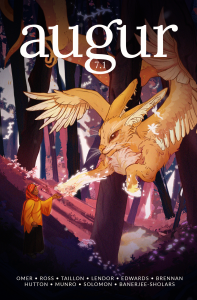Augur: Short Fiction Reviews by A.C. Wise
Grief, loss, healing, and recovery are themes running through Augur 7.1, and it’s interesting to see how different authors approach similar subject matter. “Sagal, the-Witch-in Training” by Ardo Omer follows the titular witch-in-training on her first solo case, trying to help a young woman with a broken heart. The woman happens to be the sister of one of her classmates, and they work together to convince her grief – manifested as a massive snake wrapped around her – to let go. The writing is lovely, as is the exploration of the ties between food, memory, and healing. “Moon, Moon” by E.S. Taillon is a beautifully written story about the power of stories, as a woman draws on scenarios evocative of children’s books and fairy tales as a means of coping with depression after trauma.
In “Our World is Still Blue” by Amalie Edwards, aliens referred to as Guests have taken control, giving the illusion of freedom, but executing people for things that violate their customs. Edwards effectively uses speculative fiction to explore colonialism and racism, with evocative prose and striking imagery throughout. “Once Upon a Planet” by Kelsey Hutton is a charming story that gives off Terry Pratchett vibes, in which the Aunties of the Known Universe – Mildred, Ethel, and Phyllis – try to save the planet Zerosia. “Star Berry and the Wolf Trail” by Nicole Munro sees Star Berry, one of the People of the Song and Wind and Long Grass, living among humans after the death of her husband as a balm for her grief. A Star Wolf crash lands in her crocuses, and by way of apology, takes her on the Wolf Trails through the stars to meet his family.
In “The Five Rules of Spirit Binding by Sunil the Undying (Edited by Farah, Age 13)” by M. Banerjee-Sholars, Farah is living with her grandmother following the death of her parents. She discovers a book hidden in an empty birdcage which details the summoning of a Yaksha, and begins annotating the text as a school project. Banerjee-Sholars captures the perfect voice for both Farah and the scholar Sunil, putting the two in direct conversation with each other. The story is bittersweet, balancing Farah’s loss with her hope, and puts a nice twist on the trope of summoning and binding a spirit as Farah approaches the act with kindness and a critical, academic eye, refuting Sunil’s assumptions that Yaksha are dangerous and must be subjugated, while also displaying compassion and trying to see things from his point of view.
Recommended Stories
“The Five Rules of Spirit Binding by Sunil the Undying (Edited by Farah, Age 13)”, M. Banerjee-Sholars (Augur 7.1)
This review and more like it in the December 2024 issue of Locus.
 While you are here, please take a moment to support Locus with a one-time or recurring donation. We rely on reader donations to keep the magazine and site going, and would like to keep the site paywall free, but WE NEED YOUR FINANCIAL SUPPORT to continue quality coverage of the science fiction and fantasy field.
While you are here, please take a moment to support Locus with a one-time or recurring donation. We rely on reader donations to keep the magazine and site going, and would like to keep the site paywall free, but WE NEED YOUR FINANCIAL SUPPORT to continue quality coverage of the science fiction and fantasy field.
©Locus Magazine. Copyrighted material may not be republished without permission of LSFF.








